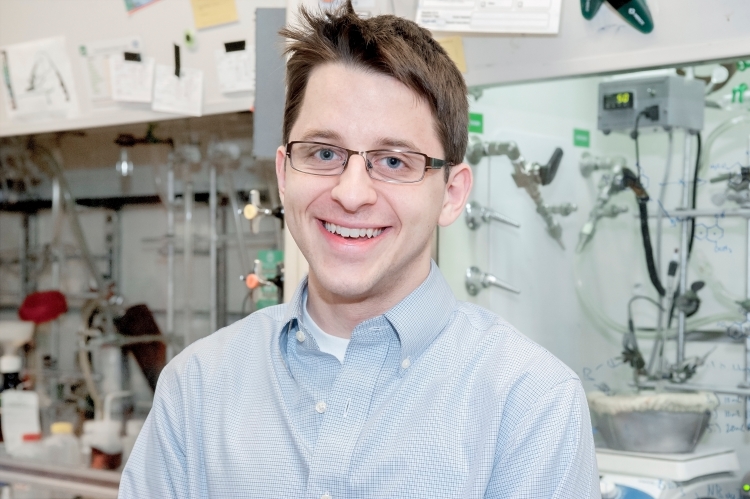
By
Chemistry major Corleone S. Delaveris ’15 has been awarded a National Science Foundation Graduate Research Fellowship that will support his graduate studies at Stanford University.
Delaveris, a member of the Morrissey College of Arts and Sciences Honors Program and a Scholar of the College, plans to study chemical biology with the goal of developing new ways to understand, diagnose and treat disease.
“I am absolutely honored,” said Delaveris, who grew up in Grandview Heights, Ohio. “I wasn’t expecting it. It’s humbling to be recognized in this kind of group.”
The NSF awarded the so-called “pre-doc” fellowships to 2,000 men and women from among 16,500 applicants in 2015. In addition to Delaveris, Casey Brodsky ’14, a chemistry major who is now a graduate student at Harvard University, received the fellowship.
The award provides three years of financial support within a five-year period, covering an annual stipend of up to $34,000 and tuition costs of up to $12,000 for graduate study that leads to a research-based master’s or doctoral degree in science or engineering, according to the NSF.
Delaveris has focused on organic chemistry as an undergraduate, working as a researcher in the lab of Professor of Chemistry Marc Snapper, where he has been involved in a project to develop a new catalyst in order to confirm theoretical models developed by Visiting Assistant Professor Fredrik Haeffner, a computational chemist.
At Stanford, Delaveris will study chemical biology, which is not an insignificant change.
“For the last two years, I have been working in organic chemistry, so going into chemical biology is a substantial change,” said Delaveris. “It’s a wonderful vote of confidence. It makes me a lot more comfortable with the idea of moving away from what I’ve been doing for a couple of years.”
Delaveris, who plans on earning a doctorate, said he’s interested in the challenges of combating illness and disease.
“What interests me is the chemistry of health and disease,” said Delaveris. “I’m interested in the broader area of how disease works, what are the mechanisms behind disease and how can we develop better diagnostics, better treatments for disease and improve human health in general.”
He cited Snapper as among the faculty who have had the biggest influence on his undergraduate studies, as well as Honors Program faculty Mark O’Connor and Joseph Breines.
Outside of class, Delaveris founded the American Chemical Society undergraduate chapter and served as the senior science editor for Elements. Among his undergraduate honors, he has received the Chemistry Department’s Excellence in Chemistry Award, the Brian Lawrence Grey Prize and the CRC Freshman Chemistry Achievement Award.
Delaveris will not be on unfamiliar turf at Stanford, having spent a summer at the US Department of Energy’s SLAC National Accelerator Laboratory in Menlo Park, working in x-ray absorption spectroscopy, or XAS.
His years at BC have been “an absolutely phenomenal experience that I would not trade for anything in the world,” said Delaveris. “Between the people I’ve met, both in class, in student clubs and in the dorms, and the things I’ve learned academically and personally, I feel like I’ve grown as a person in many different ways.”



